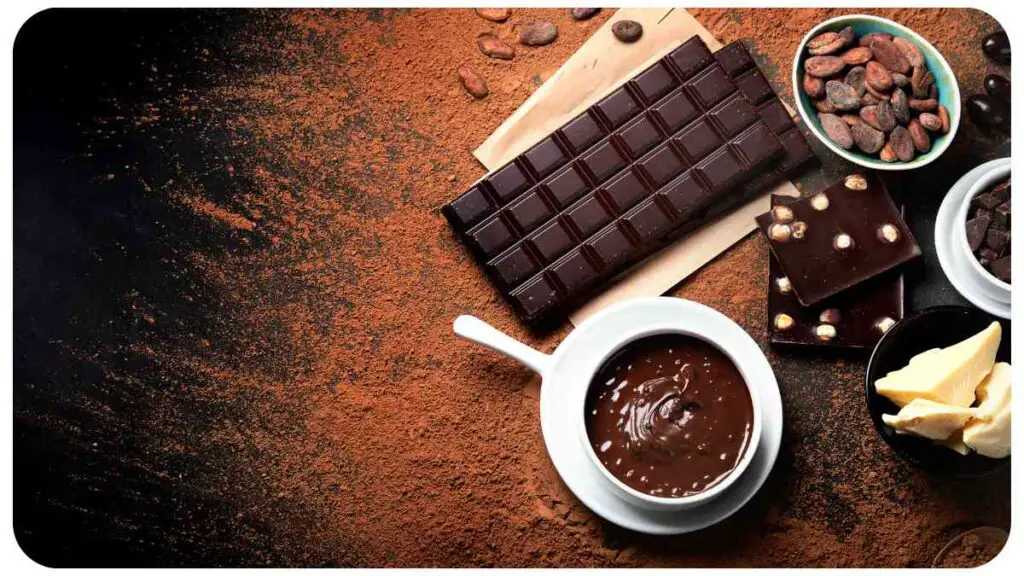As the popularity of veganism continues to grow, you may find yourself wondering about the status of your beloved chocolate treats. Are they vegan-friendly? Can vegans enjoy the pleasure of indulging in a chocolate bar without compromising their ethical values?
In this article, we will delve into the world of vegan chocolate, explore its ingredients, and provide you with a comprehensive guide to enjoy delicious chocolate while sticking to your vegan lifestyle.
| Key Takeaways |
|---|
| Vegan chocolate is a suitable option for those following a vegan lifestyle, as long as it doesn’t contain animal products. |
| Ingredients like milk, whey, honey, or gelatin make a chocolate non-vegan. |
| Cross-contamination during manufacturing can make a chocolate product non-vegan. |
| Check labels for vegan certifications or manufacturing processes that guarantee vegan-friendly chocolate. |
| Vegan-friendly chocolate brands include Alter Eco, Hu Chocolate, Loving Earth, Endangered Species Chocolate, and Rawkz. |
| Making vegan chocolate at home allows customization and control over ingredients. |
| Vegan chocolate, particularly dark chocolate, offers potential health benefits when consumed in moderation. |
| FAQ section provides answers to common questions about vegan chocolate. |
| The future of vegan chocolate looks promising, with increasing demand and ethical considerations in the industry. |
| Enjoy the delight of vegan chocolate guilt-free, while staying true to your ethical choices. |
Understanding Veganism
Before we dive into the specifics of vegan chocolate, let’s briefly touch upon what it means to follow a vegan lifestyle. Veganism is a way of life that seeks to avoid the use of animal products, be it in food, clothing, or other aspects of daily living.
Vegans make a conscious decision to abstain from consuming animal-derived ingredients, such as meat, dairy, eggs, and honey, as well as products tested on animals.
Living a sustainable vegan lifestyle goes beyond just diet. Check out the Ultimate Guide to Living a Sustainable Vegan Lifestyle for eco-friendly tips and tricks to enhance your everyday choices.
What Makes a Chocolate Non-Vegan?

To determine whether a chocolate is vegan-friendly, we need to examine its ingredients and production processes. While dark chocolate, by default, contains fewer animal products than milk chocolate, it’s essential to be vigilant and check labels for potential non-vegan components. Here are some key considerations:
Ingredients to Watch Out for
- Milk or milk powder: This obvious ingredient immediately disqualifies a chocolate from being vegan.
- Whey or whey powder: Deriving from milk, whey is another non-vegan component commonly found in chocolates.
- Honey: Often used as a sweetener, honey is produced by bees and is therefore not considered vegan.
- Gelatin: A binding agent often found in chocolates and other confectionery items, gelatin is derived from collagen obtained from animal bones and skin.
To ensure you’re enjoying a vegan chocolate, check the ingredient list thoroughly and look for alternative ingredients such as plant-based milks, non-dairy creams, or natural sweeteners.
Encountering issues with your vegan recipes? Learn how to troubleshoot common mistakes and find fixes in the Troubleshooting Your Vegan Recipes guide, ensuring your chocolate treats come out perfectly every time.
The Role of Cross-Contamination
Cross-contamination is another factor to consider. While a chocolate bar may not contain any non-vegan ingredients on its own, it could still come into contact with dairy or other non-vegan products during manufacturing.
This exposure, although unintended, renders the final product non-vegan. Look out for labels specifying vegan certification or manufacturing processes that eliminate cross-contamination risks.
Discover the science-backed Health Benefits of a Vegan Diet. From improved heart health to reduced inflammation, learn why going vegan can enhance your overall well-being.
Ethical Considerations
Beyond the ingredients, ethical considerations also play a significant role in determining the vegan-friendliness of chocolate. Some vegans avoid brands that support exploitative practices, child labor, or unsustainable farming methods. Researching the brand’s values and commitment to ethical sourcing will help you make an informed decision.
Vegan-Friendly Chocolate Brands
To make your vegan chocolate shopping experience easier, we have compiled a table below, showcasing a range of popular vegan-friendly chocolate brands:
| Brand | Vegan Options | Certifications |
| Alter Eco | Dark Chocolate Quinoa Crunch, Superdark Truffles | USDA Organic, Fair Trade |
| Hu Chocolate | Salty Dark Chocolate, Crunchy Mint Dark Chocolate | Certified Paleo, Vegan |
| Loving Earth | Salted Caramel Chocolate, Turkishly Delightful | FAIRTRADE, USDA Organic, Vegan |
| Endangered Species Chocolate | Dark Chocolate with Blueberries, Forest Mint | Non-GMO, Vegan |
| Rawkz | Dark Cacao Nib Crunch, Dark Chocolate Goji Bliss | Vegan, Organic, Non-GMO |
Table: Vegan-Friendly Chocolate Brands
Please note that this table provides a snapshot of various vegan chocolate brands, but it’s always recommended to double-check the ingredients and certifications before making a purchase.
Making Vegan Chocolate at Home
If you prefer a hands-on approach and want to enjoy chocolate that meets your vegan requirements, making your own at home is a great option. Here are a few delicious DIY vegan chocolate recipes to get you started:
| Recipe | Ingredients |
| Raw Vegan Chocolate Brownie Bites | Dates, almonds, cocoa powder, coconut oil, maple syrup, sea salt |
| Creamy Vegan Chocolate Mousse | Avocado, cocoa powder, coconut milk, maple syrup, vanilla extract |
| Vegan Chocolate Peanut Butter Cups | Dark chocolate, peanut butter, coconut oil, maple syrup |
| Vegan Chocolate Chip Cookies | Flour, coconut sugar, baking soda, salt, vegan chocolate chips |
Table: DIY Vegan Chocolate Recipes
Experimenting with these recipes not only allows you to customize the flavor and sweetness level but also gives you a sense of accomplishment as you create your own vegan chocolate delights.
Looking for compelling reasons to go vegan? Find out the Mind-Blowing Reasons to Go Vegan Today and be inspired to make a positive impact on your health, the environment, and animal welfare.
Health Benefits of Vegan Chocolate

Apart from satisfying your sweet tooth, vegan chocolate offers several health benefits. Dark chocolate, in particular, has been linked to various positive effects on cardiovascular health, brain function, mood enhancement, and antioxidant properties.
Thanks to its higher cocoa content, dark chocolate contains flavonoids and antioxidants that may contribute to these benefits. However, moderation is still key, as chocolate is also calorie-dense.
Frequently Asked Questions (FAQs)
To address common queries regarding vegan chocolate, refer to the table below:
| Question | Answer |
| Is all dark chocolate vegan? | No, not all dark chocolates are vegan. Check the ingredient list to ensure it contains no dairy or animal products. |
| Can vegans eat white chocolate? | Generally, no. White chocolate typically contains milk or milk powder, making it non-vegan. |
| Are vegan chocolates healthier than non-vegan? | Vegan chocolates can be healthier in terms of avoiding dairy, but it’s essential to consider overall ingredients. |
| Can vegan chocolate contain gluten? | Yes, some vegan chocolates may contain gluten. Check labels carefully if you have gluten intolerance or allergies. |
| Are vegan chocolates more expensive? | Vegan chocolates can vary in price, similar to non-vegan options. Shop around to find affordable and tasty choices. |
The Future of Vegan Chocolate
As veganism continues to gain traction, the demand for vegan chocolate is also on the rise. With advancements in technology and ingredient innovation, we can expect even greater options and improved taste and texture in the future.
Moreover, as more people embrace conscious consumerism and ethical practices, chocolate brands are likely to prioritize sustainability and cruelty-free production methods.
Dining out as a vegan can be a breeze with the Ultimate Guide to Dining Out as a Vegan. Discover helpful tips and tricks to navigate menus and enjoy delicious meals wherever you go
Conclusion
In conclusion, being a vegan doesn’t mean you have to give up on enjoying the blissful taste of chocolate. By carefully reading labels, understanding the ingredients, and exploring vegan-friendly brands and recipes, you can savor sweet chocolate treats while staying true to your ethical choices.
Remember to be mindful of cross-contamination and do your research to support brands that align with your values. So go ahead, indulge in the deliciousness and embrace the delights of vegan chocolate without any guilt or compromise.
Further Reading
Here are some useful resources to explore for further information on vegan chocolate:
Sweet Vegan NYC: This website offers a comprehensive guide to vegan chocolate, including recipes, product recommendations, and insightful articles on veganism and chocolate.
Purdy’s Chocolatier Blog: Purdy’s Chocolatier provides a detailed guide to vegan chocolate, discussing ingredients, labeling, and ethical considerations. Their blog post is a valuable resource for chocolate lovers looking for vegan options.
The Chocolate Bar: The Chocolate Bar’s website explores the question of whether vegans can eat chocolate. They delve into the ingredients, certification, and offer insights into vegan-friendly chocolate options.
FAQs
Can vegans eat any type of chocolate?
Vegans can enjoy chocolate as long as it is free from animal-derived ingredients like milk, whey, or honey. Look out for dark chocolate or vegan-certified options.
Is dark chocolate always vegan?
Not all dark chocolates are vegan. Check the ingredients to ensure it does not contain any animal products or by-products.
Are vegan chocolates healthier than non-vegan options?
Vegan chocolates can be a healthier choice in terms of avoiding dairy and cholesterol. However, it’s important to consider the overall ingredients and nutritional profile of each chocolate product.
Can vegan chocolate be cross-contaminated with non-vegan ingredients?
Yes, cross-contamination can occur during manufacturing processes. Look for brands that explicitly mention vegan certification or protocols to avoid cross-contamination.
What are some alternatives for milk chocolate for vegans?
Vegans can enjoy alternatives like dark chocolate, vegan milk chocolate made from plant-based milks, or even homemade vegan chocolate using non-dairy ingredients.
Please note that these answers are provided for informational purposes and individual products may vary. Always check labels and consult with manufacturers if unsure.

Hi! My name is Hellen James, and I’m a vegan lifestyle enthusiast. I’ve been living the vegan lifestyle for over 10 years now, and it’s been one of the best decisions I’ve ever made. The food is amazing, the community is incredible, and there’s no way I could go back after experiencing all this firsthand.


